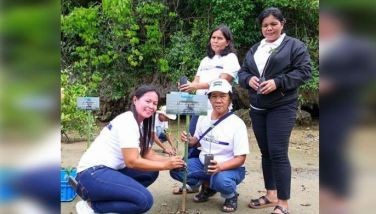Wanted: Green lawyers
"I wish I had been a lawyer. I could have done more."
The shoulders of the gray-haired woman sagged as she narrated how the environmental group that she was a part of failed in their attempt to save a forested area in Rizal Province from being turned into a subdivision. The furrow above her eyebrows deepened as she described how impossible it was to go to court and save a mountain without a lawyer to help them.
We were at a forum to discuss the Rules of Procedure for Environmental Cases. The rules are new, having been approved by the Supreme Court only in April this year. Atty. Asis Perez, a representative of the United States Department of Interior who was a member of the committee that reviewed the rules, was the main resource person. Representatives from the fishing sector, the agricultural sector, and indigenous peoples also spoke on their experiences in enforcing environmental laws.
Whose job is it to protect the environment? We have a lot of laws identifying the government agencies tasked with protecting the environment, with the Department of Environment and Natural Resources at the helm. Under the Local Government Code, local government units are also supposed to "promote health and safety" and "enhance the right of the people to a balanced ecology." Atty. Perez said that at an Environmental Law Enforcement Summit in 2006, Philippine environmental law enforcement was described as "weak," "fragmented," "insufficient," "ineffective," "inadequate," and characterized by "ningas kugon" by the same persons tasked with enforcing environmental laws.
Theoretically, the Rules of Procedure for Environmental Cases is supposed to make it easier for us as citizens to go to court and to assert our right to health and to a balanced ecology. Under the rules, any Filipino citizen in representation of others, including minors or generations yet unborn, may file an action to enforce rights or obligations under environmental laws. The right to sue based on intergenerational responsibility was first recognized in the landmark Oposa v. Factoran case in 1993 and the rules erase any doubt as to its applicability in environmental cases.
I wish that I could say that I left the forum feeling happy and confident that the new rules would make enforcement of environmental laws easier. I did not. At the end of the forum, I felt a gnawing fear that the rules will just emphasize the need to litigate and consequently, for competent lawyers who can handle environmental law cases. Where will we find competent lawyers willing to handle environmental law cases?
Graduating from law school and passing the Bar exams are not enough to make one a competent lawyer, much less a good litigator. Being a good writer of pleadings does not always mean that one is a good trial lawyer. Handling environmental law cases may require a thorough study of scientific concepts. I personally know less than five lawyers who have handled environmental law cases. And I have no idea how many cases they actually won.
Environmental protection is too important to be left to courts and lawyers. I still believe that community-based actions work better. If we see that there is a direct connection between the state of our bodies and the state of nature, we probably would refuse to allow polluting factories or power plants to be located in our community. If we knew that the victims of the Marcopper mining disaster in Marinduque continue to suffer years after the accident, we probably would be more vigilant about mine tailings contaminating our water supply.
* * *
Email: [email protected]
- Latest
- Trending





















